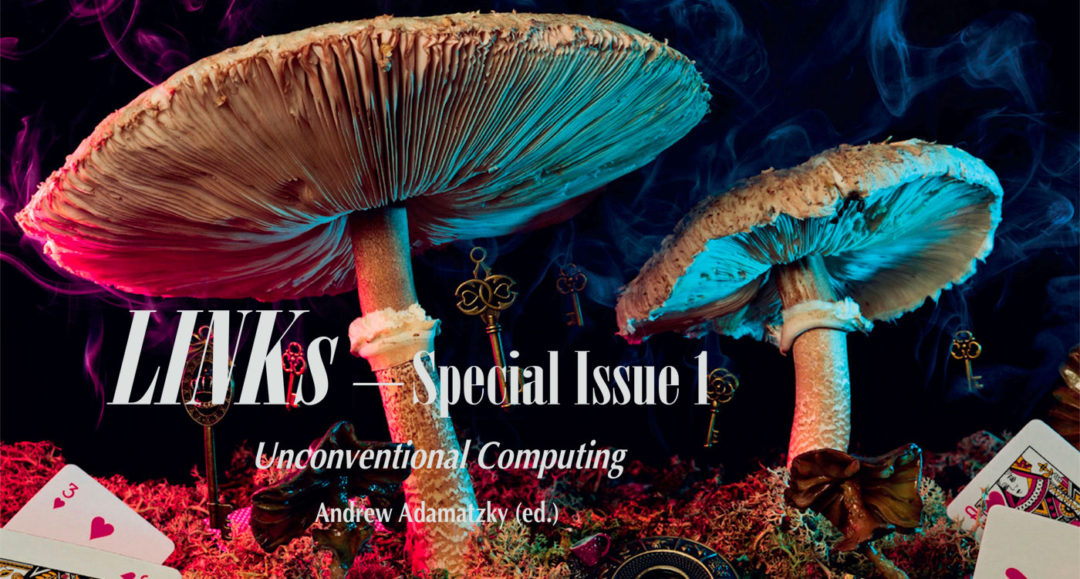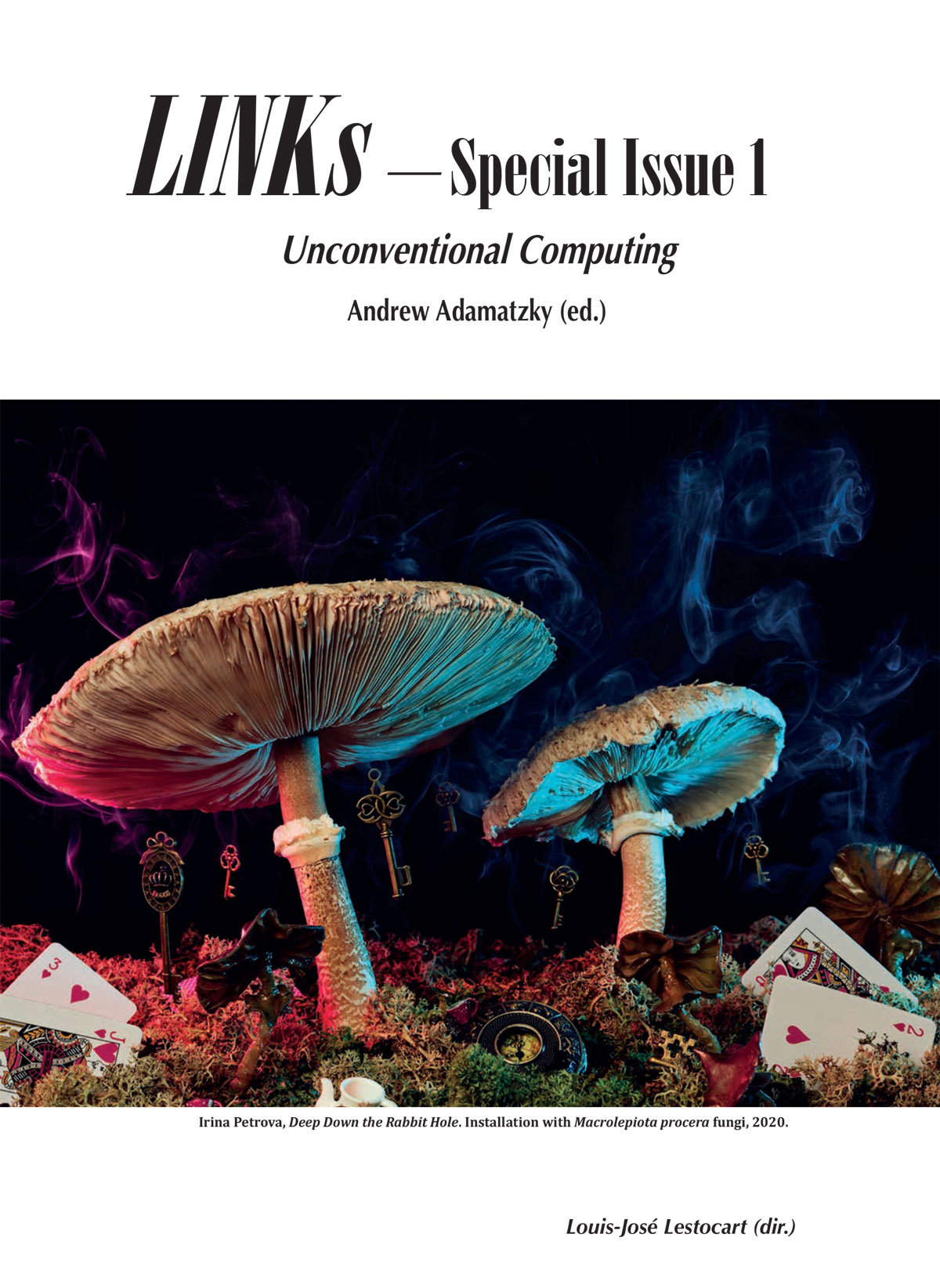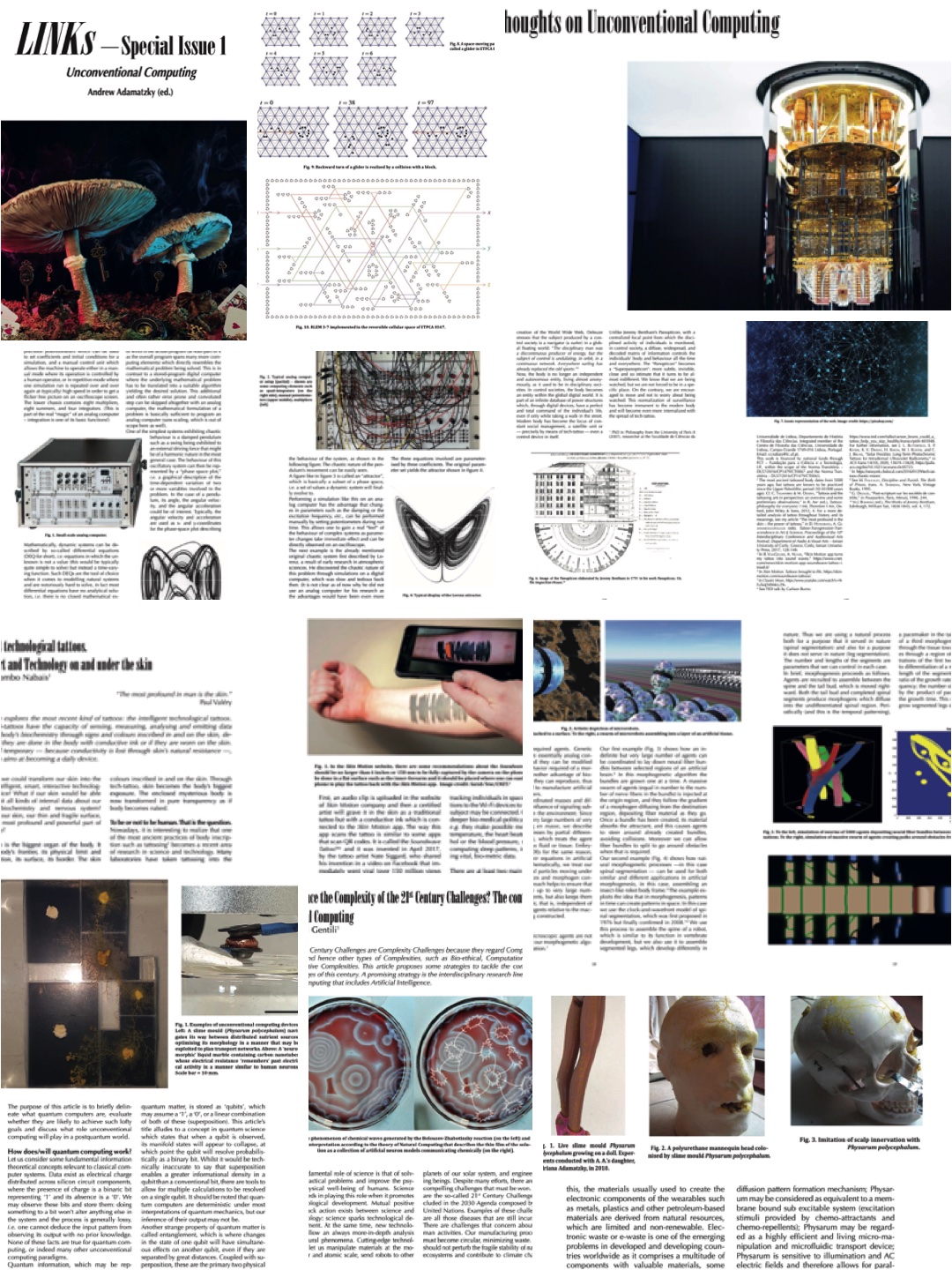Under the impulsion of Andrew Adamatzky (Professor and director of Unconventional Computing in the Department of Computing and Creative Technology, University of the West of England in Bristol), LINKs publishes alongside the brand new issues 5 and 6 of the review, its first special edition (in English) around unconventional computing.
As explained in his introduction, Andrew Adamatzky: “There is no strict definition of unconventional computing. Being an unconventional computist is not a matter of training but thinking and living. Phenomenologically most works on unconventional computing are about implementation of computing in novel substrates (chemical, physical, biological), development of computing schemes and algorithms not fitting into the mainstream framework, or designing of computing architectures inspired by chemical or biological systems/special edition)”.
This special 100-page issue of LINKs gives a good multidimensional overview of the field of “unconventional computing” with some twenty in-depth articles (by researchers and academics from the UK, United States, Canada, Germany, Poland, Japan…), all nicely illustrated.
LINKs-series
Transdisciplinary and international review launched in October 2019, both demanding and accessible free of charge, LINKs is a beautiful stirrer of thoughts that crosses different fields of scientific investigation (from neurosciences to quantum physics, from artificial intelligence to systems theory), philosophical, artistic (again with a wide range covered and crossing various contemporary practices). We can only support such an adventure which succeeds in bringing together such a great committee of talented researchers, academics, critics, artists.
As Louis-José Lestoquart, the director / initiator of this unique review, which also combines French and English, points out:
“In a context where culture and civilizations are in transition, where global politico-economic and technological data are once again disrupted, particularly with the emergence of Big Data, connected objects and transhumanist thinking, LINKs is breaking away from reductionists and questions the notion of reality through kinds of “thought experiments”.
It offers essays more than theories. She does not “teach” specifically, but experiencing and living herself through her writings, she shows attempts, operates through very varied and extensive fields, returns in infinite numbers, in order to find the right language, the principle of intelligibility”.
Thoughts on Unconventional Computing
“There is no strict definition of unconventional computing. Being an unconventional computist is not a matter of training but thinking and living. Phenomenologically most works on unconventional computing are about implementation of computing in novel substrates (chemical, physical, biological), development of computing schemes and algorithms not fitting into the mainstream framework, or designing of computing architectures inspired by chemical or biological systems. This special issue of LINKs gives a snapshot of the unconventional computing field. Articles presented are punchy and well illustrated.
I don’t feel there is a need to introduce each article because they all are short and self-contained and as well can be seen as extended abstracts or essays of the authors research profiles. All articles of the issue are authored by the world-leading experts in the field. The issue will serve well as a light-touch introduction to unconventional computing for people not familiar with computing and might inspire artists and humanitarians to enter the field.”
Andrew Adamatzky, Bristol
January 2021
Special Issue 1 – UNcoNveNtIoNaL compUtINg
- Andrew Adamatzky
Préface - Selim G. Akl
Computational Nonuniversality: Philosophical and Artistic Perspectives - Bruce MacLennan
Swarms of microscopic agents self-assemble into complex bodies - Bernd Ulmann
Exploring chaos with analog computers - Olga Kosheleva and Vladik Kreinovich
Are There Traces of Megacomputing in Our Universe - Dawid Przyczyna, Marcin Strzelecki, Konrad Szaciłowski
Communication, information and music - Zoran Konkoli
Unconventional sensing: doing it unusual way in unusual settings - Mark Burgin
Induction versus Deduction in Science, Computing, Literature and Art - Andrew Adamatzky and Irina Petrova
Fungal Grey Matter - Alessandro Chiolerio
Le vignoble cosmique - Kenichi Morita
Novel reversible logic elements for unconventional computing - Nancy Salay
An Unconventional Look at AI: Why Today’s Machine Learning Systems are not Intelligent - Jordi Vallverdú
The benefits of being wrong: bonding epistemic and cognitive incompleteness for natural and artificial intelligent systems - Richard Mayne
Collapsing the wave function on postquantum unconventional computing - Pier Luigi Gentili
How to face the Complexity of the 21st Century Challenges? The contribution of Natural Computing - Dan V. Nicolau, Jr.
The Quantum Computing Delusion - Genaro J. Martínez, Andrew Adamatzky, Marcin J. Schroeder
The art of unconventional computing with cellular automata - Andrew Adamatzky, Anna Nikolaidou, Antoni Gandia, and Alessandro Chiolerio
Living wearables from slime mould and fungi - Stefan Höltgen
Brain Lego. Toy Computing with Lego Bricks - Catarina Pombo Nabais
Intelligent technological tattoos. Science, Art and Technology on and under the skin
Comité de rédaction
Director of publication: Louis-José Lestocart, Art and film critic, essayist, theorist of Complexity
Ed. : Andrew Adamatzky – professeur
Founders members
- Jean-Paul Allouche, Directeur de recherche au CNRS, Institut Mathématique de Jussieu, Paris6.
- Luciano Boi, Maître de conférences à l’École des Hautes Études en Sciences Sociales, Centre de Mathématiques et Équipe de Mésologie, Paris.
- Bruno Pinchard, Professeur de philosophie, Université Lyon III.
- Maurice Courbage, Professeur, Théorie des Systèmes Complexes, Laboratoire Matière et Systèmes Complexes, Université Paris 7.
- Emmanuel Ferrand, Maître de conférences, Institut Mathématique de Jussieu, Paris6.
- François Jouen, Neurosciences, Informatique, Traitement d’image Directeur d’études à l’École Pratique des Hautes Études, Modélisation, Épigénétique et Développement (MÉDé).
Active members
- Andrew Adamatzky, Professor of Unconventional Computing, Director of the Unconventional Computing Lab, UWE, Bristol.
- yann beauvais, Cinéaste expérimental et théoricien.
- Mariano Bizzarri, PhD, M.D. professeur agrégé de biochimie, Département de médecine expérimentale de l’Université La Sapienza, Rome.
- Vincent Fleury, Directeur de recherches au CNRS, laboratoire Matière et Systèmes Complexes de l’Université de Paris7.
- Christophe Kihm, Professeur à la Haute école d’art et de design de Genève (HEAD-Genève). Responsable du programme de recherche « Habiter l’espace extraterrestre » (FNRS).
- Jean-Claude Serge Levy, Professeur Émérite, Laboratoire Matériaux et Phénomènes Quantiques, Université de Paris7.
- Giuseppe Longo, directeur de recherche au CNRS, biologie théorique, Centre Cavaillès, ENS et Tufts University, Boston.
- Maël Montévil, Théoricien de la biologie, Docteur es sciences, Institut de Recherche et d’Innovation (IRI),Centre Pompidou.
- Fernando Vidal, Directeur de recherche, Institution catalane de recherche et d’études avancées, ICREA, Barcelone.
- Guiseppe Vitiello, Professeur honoraire, Département de physique, Université de Salerne.
Historical member
- Bernard Stiegler (1952-2020), Professeur à l’Université Technologique de Compiègne (UTC), distinguished professor at Nanjin University, visiting professor at the China Academy of Arts, Hangzhou, directeur de l’Institut de recherche et d’innovation (IRI), Centre Pompidou.
Infos
- 01.2021
- LINKs series – ISSN 2592-6756
- Directeur de la publication Louis-José Lestocart
- links-series.com
Production
- Projet initié par Louis-José Lestocart
- Avec le soutien des European Pepinieres of Creation et de Transcultures
- pepinieres.eu – transcultures.be



